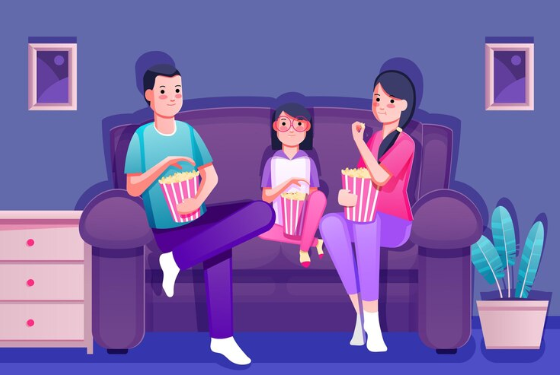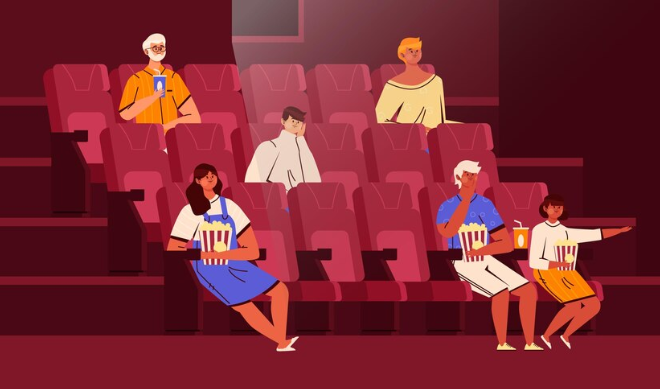Does watching Hollywood movies improve English speaking skills?
Contents

Ever wondered if you could improve your English speaking skills by just watching Hollywood movies? Well, it might surprise you to know that even Hollywood stars like Salma Hayek, a native Spanish speaker, kick-started her English learning journey by watching close-captioned English movies. It's an unconventional method, but one that has proven effective for many non-native speakers.
Now, if you're wondering if you too can learn English from Hollywood movies, read on! As we all know, Hollywood produces some of the finest films worldwide that are rich in diverse contexts and spoken English. All genres - be it drama, comedy, or science fiction - offer distinct language learning opportunities. This blog post explores the impact of Hollywood cinema on English language acquisition, specifically focusing on non-native speakers in India.
In this blog, we'll explore how Hollywood movie viewing can enhance your vocabulary, fluency, pronunciation, and understanding of colloquial language. We'll also cover practical tips to maximise your learning experience and provide relatable examples to guide you on this journey. So sit back and grab some popcorn as you get ready to turn your movie time into productive English learning sessions!
Does Watching English Movies Improve Speaking Skills?
The answer is resoundingly affirmative! Research and expert opinion align to validate that watching English movies, especially Hollywood ones, can actually enhance your speaking skills remarkably. An academic study titled Teaching English through English Movies: Advantages and Disadvantages, for instance, affirms this view. It concludes that films provide a rich, immersive language experience, assisting learners in improving their pronunciation, vocabulary, sentence structure, and fluency.
Movies are essentially a treasure trove of real-life dialogues presented in varied scenarios. They offer you an opportunity to hear conversational language used by native speakers in a natural context. You will not only grasp the grammatical rules but also understand how they are applied in everyday conversations.
Moreover, watching Hollywood movies exposes you to cultural nuances and real-world applications of expressions that might not be covered in textbooks. For example, phrases like 'hang out', 'catch up' or 'what’s up' have specific cultural connotations which are best understood when heard being used naturally.
Ultimately every movie offers a chance for learning if approached the right way. So, without a doubt, watching English movies does help improve English speaking skills! It is not just entertaining but also an effective strategy that can improve communication skills.
Which Movies Help in Improving English?

Choosing the right movies can make a world of difference in your journey to learning English. A few factors you should consider include movie genre, difficulty level, and context.
Firstly, consider the genre of the movie. Comedies and dramas often use everyday language, making them an excellent choice for beginners. On the other hand, science fiction or historical films may use complex vocabulary that could be challenging for new learners. Choosing a movie also depends on your taste and interests. If you’re a fan of action movies, you will likely be introduced to short and powerful dialogues. Romantic films could expose you to everyday conversations and delicate nuances of spoken English.
The difficulty level is another crucial aspect of this learning process. Starting off with complex narratives may lead to confusion rather than comprehension. Opt for movies with simple storylines and clear dialogues initially. Gradually move towards more intricate plots as your understanding improves.
Context is yet another key factor in this approach. Movies that reflect cultures or settings you are familiar with can make understanding easier by providing relatable contexts. Movies set in an office environment can help you learn business English.
Here are a few notable movie recommendations for you to check out:
Toy Story (1995) | Great for beginners due to its accessible language. |
Harry Potter Series (2001-2011) | Helps in understanding British accents and colloquial expressions. |
Forrest Gump (1994) | Teaches idiomatic expressions and the Southern American accent. |
The Social Network (2010) | Useful for learning modern phrases and technical jargon. |
The Intern (2015) | Great for understanding conversational and workplace language. |
Sherlock Holmes (2009) | Helps in understanding complex sentence structures. |
Before Sunrise (1995) | A rich source of romantic dialogues and idioms. |
The Pursuit of Happyness (2006) | Ideal for enhancing listening skills and understanding American accents. |
Inception (2010) | Recommended for advanced learners due to its complex narrative and dialogue. |
Shawshank Redemption (1994) | Excellent for understanding dramatic dialogues and narration. |
To simplify this process further, we recommend checking out Clapingo's blog post 30 English Movies To Learn English: Know How The Language Works. It offers a well-curated list of 30 Hollywood movies that can help improve your English speaking skills.
Selecting the right Hollywood movie to improve your English speaking skills is just as important as regular practice. So, choose wisely and enjoy your learning journey!
You can also check out this Clapingo movie recommendation video on YouTube: Movie recommendation- The Parent Trap (Clapingo)
How to Learn English from Movies? A Step-By-Step Guide
Using movies to improve your English speaking skills isn't as simple as hitting play. It requires a structured approach that encompasses pre-viewing, during-viewing, and post-viewing activities. Let's break down each stage:
Pre-viewing Activities:
1. Choose the Right Movie: Not all Hollywood movies will be beneficial for language learning. Opt for films with clear dialogues and commonly used phrases. Films like 'Notting Hill' or 'The Social Network' are great starting points.
2. Understand the Context: Read a brief summary of the film so you can focus on the language rather than trying to understand the plot.
3. Prepare Vocabulary List: Identify some words you think might come up in the movie and learn their meanings beforehand.
During-viewing Activities:
1. Listen Actively: Pay attention to pronunciation, intonation, and accent of characters. Can watching movies thus improve communication skills? If you're an active listener, then absolutely!
2. Pause and Repeat: After a dialogue delivery, pause the movie and try to mimic it, focusing on pronunciation and fluency.
3. Note Down New Phrases: Keep a notebook handy to jot down unfamiliar phrases or expressions.
Post-viewing Activities:
1. Review Vocabulary: Go through the words and phrases you noted down during viewing. Use them in sentences to ensure understanding.
2. Discuss the Movie: Talk about the film with friends or family in English to practice new vocabulary in conversation.
3. Watch Again Without Subtitles: This tests your comprehension and listening skills without any aids.
Let us look at some examples to see how listening to phrases in movies can be helpful for language learning:
Consider the famous dialogue from Notting Hill: "After all... I'm just a girl, standing in front of a boy, asking him to love her." You can try repeating this line focusing on pronunciation and intonation.
In The Pursuit of Happyness, Will Smith's character says, "Don't ever let somebody tell you... You can't do something." Here, "Don't ever let" is a common phrase used for emphasis, while "you can't do something" is a simple sentence that's easy to understand.
In the rom-com When Harry Met Sally, we hear the phrase, "I'll have what she's having." It's a simple request you could use at your favourite restaurant.
With these steps and tricks, you're equipped to learn English from Hollywood movies effectively. Happy viewing! For a live demonstration of how movies help understand accents and enhance language skills, check out this YouTube video: Should I Use British or American English?
Challenges and Limitations of Learning English from Movies

As we have seen, Hollywood movies can offer a fun way to learn English. However, they also present certain challenges. Language learners might struggle to understand complex dialogues, accents, idioms, or cultural references. The fast-paced speech in movies might overwhelm beginners, and without professional guidance or feedback, it's hard to correct pronunciation errors or clarify doubts.
Let’s illustrate this with an example. Suppose a movie character says, "She’ll be over the moon when she hears the news!" If you're not familiar with the idiom "over the moon", you might assume it has something to do with astronomy! Here, professional assistance would clarify that "over the moon" means extremely happy.
Another limitation is that movies don't provide structured learning like a language course. They are great supplementary tools but relying solely on them might lead to learning gaps in grammar rules, vocabulary building, and pronunciation techniques.
So how can we overcome these challenges? Consider integrating your movie-watching habit with formal English learning channels. For instance, while continuing your regular English classes, watching Hollywood movies can be an additional practice tool. Also, consider using subtitles initially to better understand dialogues and expressions.
Making notes while watching movies can be helpful too. Jot down new words and phrases and try to use them in conversations. This real-life application will improve your recall and usage.
So, does watching English movies improve English speaking? Yes - but it isn’t a standalone solution. It’s like going on a boat ride for relaxation but also learning how to row in the process! Watching Hollywood movies can indeed improve communication skills when combined with other effective learning methods.
Hence even though you can learn English from Hollywood movies, remember to supplement this approach with other tools for balanced learning progress.
How Can Clapingo Support Your Learning Journey?
While Hollywood movies can indeed be a useful tool for improving your English speaking skills, Clapingo, with its unique offerings, is here to provide a more structured and personalised approach to mastering English.
Think of it: watching movies can help improve communication skills. But it's like trying to assemble a jigsaw puzzle without the picture on the box. The pieces are all there, but putting them together can be daunting. That's where Clapingo steps in.
With Clapingo’s one-on-one personalised coaching sessions, you have access to native English speakers who understand your struggles as a non-native speaker. These tutors guide you with fluency, pronunciation, vocabulary, and sentence structure - the building blocks of efficient communication - thus providing a more systematic approach compared to simply watching Hollywood movies.
Moreover, the flexible session scheduling feature ensures that no matter how busy your schedule is, learning English does not take a back seat. You can easily fit in your language training at any time convenient for you.
Plus, the sessions are conducted in the learner's native language which helps establish an immediate comfort zone and ensures better understanding. This personalised touch is something you won't get from watching movies alone.
Finally, Clapingo’s diverse plans cater to different needs - whether you're preparing for an interview or want to improve your day-to-day conversation skills - there’s always something suitable for you.
So if you've been asking yourself: remember that while watching Hollywood movies certainly does help, having professional guidance such as Clapingo will expedite and streamline your journey towards fluent English communication. So why wait? Continue your adventure into the world of English-speaking with Clapingo!
Check out this YouTube video to learn more: Become a Fluent English Speaker with Clapingo. Crack your next interview with ease.
Summing Up
In our journey of exploring the potential benefits of watching Hollywood movies to improve English speaking skills, we've travelled through some fascinating insights and practical tips. We've discovered how films offer a natural context for understanding common phrases, slang, and accents while also enriching our vocabulary and pronunciation.
Remember, Hollywood is a vast ocean of linguistic treasures ready to be explored. From timeless classics to modern blockbusters - each movie is an immersive lesson in spoken English. And with subtitles at your disposal, you can experience the language at your own pace.
But let's not forget that while movies are a great supplement, they're not a substitute for focused learning. Clapingo's personalised coaching sessions equip you with specific linguistic skills tailored to your needs. Their one-on-one classes provide a safe space where you can interact with native English speakers and practice what you've learned from the movies.
So here's our parting thought: Don't limit yourself to traditional methods of learning English. Embrace unconventional yet effective avenues like watching movies, which make the process enjoyable and relatable. Step out of your comfort zone, immerse yourself in the language, and witness your communication skills flourish. Remember - every dialogue heard, every phrase understood brings you one step closer to fluency!
FAQs
1. How can watching Hollywood movies improve my English speaking skills?
Watching Hollywood movies can be a fun and effective way to enhance your English speaking skills. Through movies, you gain exposure to natural, conversational English in various accents and dialects. The dialogues can help you understand context, idioms, and colloquial expressions. Subtitles aid in vocabulary building.
2. Can I learn American accent by watching Hollywood movies?
Yes, definitely! By consistently watching Hollywood films, particularly those set in regions with the accent you're interested in, you'll pick up pronunciation nuances and intonation patterns characteristic of the American accent.
3. Will watching movies alone make me fluent in English?
While movies are a great tool for learning English, they might not be enough to achieve complete fluency. To become fluent, you should also engage in regular speaking practice and take part in conversations with native speakers. Platforms like Clapingo offer one-on-one sessions with native English speakers for this very purpose.
4. How often should I watch Hollywood movies to improve my English?
Watching a Hollywood movie once or twice a week should suffice if complemented with regular conversational practice and vocabulary exercises. Remember, consistency is key when it comes to language learning!
Comments
Your comment has been submitted